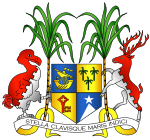|
Prime Minister of Mauritius
The prime minister of Mauritius (French: Premier Ministre de Maurice) is the head of government of Mauritius. He presides over the Cabinet of Ministers, which advises the president of the country and is collectively responsible to the National Assembly for any advice given and for all action done by or under the authority of any minister in the execution of his office. The position is the most powerful constitutional office in the country. This is mainly because the office is amalgamated with other functions whereby conventions, the office holder is also the minister of defense & home affairs (which makes the office holder responsible for law and order, internal security, defense, the armed forces and intelligence services), the leader of the National Assembly (which makes the office holder responsible for setting the agenda for parliament) and minister for Rodrigues & dependencies (which makes the office holder responsible for + occupancy, administration of local dependencies and their defense). It is also inter-alia, the head of government and presides over the cabinet of ministers. It is second in the order of precedence just after the president and enjoys relative importance in the public as the officeholder is usually the leader of the party/alliance that wins an election. The current prime minister of Mauritius is Navin Ramgoolam, leader of the Labour Party; he was appointed by president Prithvirajsing Roopun on 12 November 2024, following the resignation of prime minister Pravind Jugnauth.[2][3][4] The official residence of the prime minister during his term in office is the Clarisse House, the Prime Minister's Office is located in Port Louis. The longest serving prime minister is Anerood Jugnauth, who held the office of prime minister for about 19 years; if Navin Ramgoolam stays in office for a complete term, he will overtake Anerood Jugnauth. Overview
The current prime minister's portfolio includes inter-alia, the following:[5]
The prime minister is appointed by the president. The prime minister holds the second most senior position in the country, second only to the president. The prime minister is usually the leader of the largest party in the ruling coalition. The position of prime minister along with the office of deputy prime minister is specified under Chapter VI, Section 59, Part 1 of the Constitution of Mauritius. After the country became a republic on 12 March 1992, the president became the head of state. The president holds prerogative powers which includes summoning, prorogation and dissolution of parliament including appointment of the prime minister and Cabinet. The prime minister has the constitutional duty to advise him/her when to exercise these prerogatives. HistoryPre-IndependenceDuring the British Mauritius period, it was the chief minister who was the head of government, executive powers was vested by the governor, representative of the monarch. The only chief minister that the country had known was Sir Seewoosagur Ramgoolam, from 26 September 1961 to 12 March 1968.[6] IndependenceThe office of Prime Minister of Mauritius was created on 12 March 1968 when Mauritius became an independent state. Queen Elizabeth II remained as head of state as Queen of Mauritius, with her executive powers in Mauritius delegated to the governor-general. After the 1967 general election, Sir Seewoosagur Ramgoolam (SSR) became the first prime minister of Mauritius, he was re-elected in the 1976 general election and remained in office. In the 1982 general election, Sir Anerood Jugnauth (SAJ) coalition was elected, and he became prime minister. However his alliance broke up in 1983 and the 1983 general election was held, SAJ formed another alliance, and he was elected again and remained in office. In the 1987 general election, another coalition concluded by SAJ won again, and he remained in office. SAJ also won the 1991 general election and remained the prime minister of Mauritius. The new leader of the Labour Party, Navin Ramgoolam, became the leader of the opposition. Republic After the country became a republic on 12 March 1992, the president became the head of state. The president holds prerogative powers which includes summoning, prorogation and dissolution of parliament including appointment of the prime minister and Cabinet. The prime minister has the constitutional duty to advise him/her when to exercise these prerogatives. On 12 March 1992, Mauritius became a republic, with a new constitution in 1992, the terms of the general elections were regulated to five years. Since then, every five years elections have taken place and a new prime minister is elected. After the 1995 general election, Dr Navin Ramgoolam became Prime Minister of Mauritius for the first time. However, he lost the 2000 general election. In 2000, the prime minister's office was shared between two leaders: Sir Anerood Jugnauth spent three years as prime minister and Paul Bérenger spent two years. After the 2005 general election, Dr. Navin Ramgoolam became the prime minister again. In the 2010 general election, he was re-elected and remained in office.[7] The 2014 general election returned Anerood Jugnauth to the prime minister's office. Pravind Jugnauth was appointed as prime minister by President Ameenah Gurib-Fakim on 23 January 2017, following the resignation of his father and coalition leader Anerood Jugnauth. Pravind won the 2019 general election, which kept the MSM in power. OathsAccording to the third Schedule of the Constitution of Mauritius, an oath under this section shall be administered by the Prime Minister.[8]
See also
ReferencesWikimedia Commons has media related to Prime ministers of Mauritius.
|
||||||||||||||||||||||||||||||||||||||||||||



